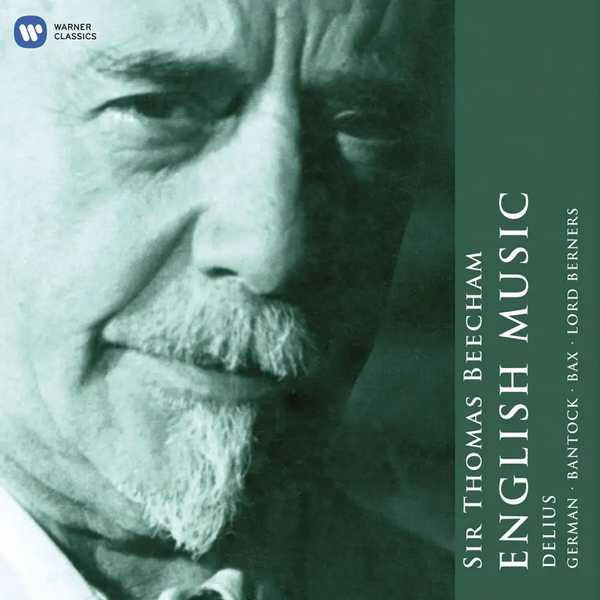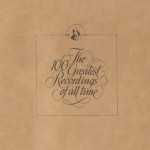
Composer: Granville Bantock, Arnold Edward Trevor Bax, Frederick Delius, Edward German, Gerald Hugh Tyrwhitt-Wilson
Orchestra: Royal Philharmonic Orchestra
Conductor: Sir Thomas Beecham
Number of Discs: 6
Format: FLAC (tracks)
Label: Warner
Catalogue: 9099152
Release: 2011
Size: 2.01 GB
Recovery: +3%
Scan: yes
CD 01
01. Delius: Over the hills and far away
02. Delius: Sleigh Ride
Delius: Brigg Fair
03. Introduction (Slow. Pastoral)
04. I. Theme (with easy movement)
05. Variation 1
06. Variation 2
07. Variation 3
08. Variation 4
09. Variation 5
10. Variation 6
11. II. Interlude (Slow and very quietly)
12. III. Variation 7 (Rather quicker but not hurried)
13. Variation 8
14. Variation 9 (With easy movement)
15. Variation 10
16. Variation 11 (Slow. With solemnity)
17. Variation 12 (Maestoso)
18. Transition
19. IV. Variation 13 (Gaily)
20. Variation 14
21. Variation 15
22. Variation 16
23. Transition (Rather quicker)
24. Variation 17 (Rather slower. Very broadly)
25. Coda (Very quietly)
Delius: Florida Suite
26. I. Dance
27. II. By the River (Andantino)
28. III. Sunset (Moderato) – Danza (Allegretto)
29. IV. At Night (Andante moderato)
30. Delius: Marche Caprice
CD 02
01. Delius: Dance Rhapsody No. 2
02. Delius: Summer Evening
03. Delius: On Hearing the First Cuckoo in Spring
04. Delius: Summer night on the river
05. Delius: A Song Before Sunrise
06. Delius: Fennimore and Gerda: Intermezzo
07. Delius: Irmelin Prelude
Delius: Songs of Sunset
08. A song of the setting sun! (Quietly)
09. Cease smiling, dear! (With easy movement).
10. Pale amber sunlight falls (Slow).
11. Exceeding sorrow consumeth my sad heart! (Con tristezza. Not too slow).
12. By the sad waters of separation (With quiet movement).
13. See how the trees and the osiers lithe (Freshly).
14. I was not sorrowful (Very quietly but not too slow)
15. They are not long, the weeping and the laughter (Quietly).
CD 03
Delius: A Dance Rhapsody No. 1
01. Lento –
02. Comodo –
03. Vivo –
04. Più lento tranquillo –
05. Molto adagio
Delius: Violin Concerto
06. With moderate tempo –
07. Slower –
08. Tempo I – Allegretto – Più moderato
Delius: A Song of the High Hills
09. With quiet easy movement – Tranquillo –
10. Very slow (The wide, far distance – The great solitude) – Slow and solemnly –
11. In tempo –
12. Very quietly – Tempo I
13. Delius: On the mountains
CD 04
Delius: A Village Romeo and Juliet
01. Scene 1 – September. A piece of land on a hill
02. Scene 2 – Six years later. Outside Marti’s house
03. Scene 3 – The Wildland
04. Scene 4 – Interior of Mart’s house (part 1)
05. The dream of Sali and Vrenchen (Wedding Scene)
CD 05
Delius: A Village Romeo and Juliet
01. Scene 5 – The Fair
02. The Walk to the Paradise Garden
03. Scene 6 – The Paradise Garden
Delius: Sea Drift
04. Once Paumanok –
05. Shine! shine! shine! –
06. Till of a sudden –
07. Blow! blow! blow!
08. Yes my brother I know –
09. O rising stars! –
10. O reckless despairing carols –
11. O past! O happy life
CD 06
German: Gipsy Suite – Four Characteristic Dances
01. Valse Mélancolique (Lonely Life)
02. Allegro di molto (The Dance)
03. Menuetto (Love Duet)
04. Tarantella (The Revel)
Bantock: Fifine at the Fair – A Defence of Inconstancy
05. Part 1 (clarinet: Jack Brymer)
06. Part 2
07. Bax: The Garden of Fand – tone poem
Tyrwhitt-Wilson: The Triumph of Neptune – Ballet Suite
08. Schottische
09. Hornpipe
10. Polka (The Sailor’s Return)
11. Harlequinade
12. Dance of the Fairy Princess
13. Sunday morning (Intermezzo)
14. Apotheosis of Neptune
sir-thomas-beecham-english-music-02.rar – 392.5 MB
sir-thomas-beecham-english-music-03.rar – 333.7 MB
sir-thomas-beecham-english-music-04.rar – 262.6 MB
sir-thomas-beecham-english-music-05.rar – 275.7 MB
sir-thomas-beecham-english-music-06.rar – 355.4 MB
There can be few, if any, musicians who have singlehandedly done so much in the establishment of resources for musical performance than Sir Thomas Beecham.
During WWI he conducted and supported financially both the Hallé and London Symphony Orchestras and the Royal Philharmonic Society. In 1915 he formed the Beecham Opera Company which trained many young British singers in this field. Eight years later this became the British National Opera Company and was absorbed into Covent Garden in 1932 when Beecham returned to be its Musical Director.
To quote David Cairns “We are nationally and individually a more musically aware people because of him and what he gave us”. A forceful statement, true, but whose life could ever challenge it?
Dissatisfied by conditions and practices, notably the supply of deputies for rehearsals, prevalent in British orchestras, he formed the London Philharmonic Orchestra that same year. Beecham was now able to be at the fulcrum of all developments in music in Britain. WWII put an end to this halcyon period. With Covent Garden shut he travelled, primarily in America, and did not return to Britain until 1944. The London Philharmonic had now become a self-governing body so Beecham, then aged 67, launched the Royal Philharmonic Orchestra. This was the orchestra with which he committed to disc so many classic recordings with which EMI Classics marks the 50th anniversary of his passing.
It is true that Beecham had particular favourites in composers – Haydn, Mozart, Schubert, Berlioz, Bizet and Puccini spring immediately to mind; also his love for Handel – even though his performances were always BIG-scale! He was an early champion of Richard Strauss and became a most effective exponent of Sibelius. His name will always be inextricably linked with that of Delius whose music Beecham seemed to know better even than the composer and it is appropriate that they are buried not far apart in the graveyard at St. Peter’s Parish Church, Limpsfield, Surrey.
He was knighted in 1916, the year he succeeded to his father’s baronetcy, and made a Companion of Honour in 1957.This affable, brilliant, usually charming, ever-communicative, quick-witted – even, at times, to the point of cruelty, dedicated conductor was also the most gifted executive musician England has ever produced.
He was fortunate that his grandfather, a chemist, had created the highly successful pharmaceutical manufacturing business which bore his name. His father, who had started in the company whilst still a teenager, was also fond of music so he was prepared to fund his son’s enthusiastic appetite to attend operas and concerts both here and abroad.
Born on 29th April 1879 in St. Helens, he attended public school at Rossall where his talent at the piano became a legend (the only boy ever to have been allowed a grand piano in his study!). From there he briefly attended Oxford (Wadham) but the composition classes, with Charles Wood in London and Moszkowski in Paris, were funded privately. As a conductor he was purely self-taught.
He formed an orchestra in his home town and deputised for Richter at a Hallé concert when his father was mayor. His career path was clear: he would use his financial resources to support the art which he enjoyed with the aim of bringing it to as many as possible.
At the age of 30 he launched the Beecham Symphony Orchestra, all young and carefully chosen. They would tour, play for opera and ballet and give concerts of adventurous music. London duly welcomed him for a season of intensive opera performances and over the next three years introduced many new ones to British audiences, including by Strauss, Delius and the Russians. He also brought Diaghilev’s Ballets Russes starring Nijinsky and Karsavina to the British stage.



